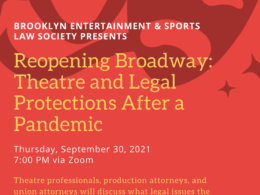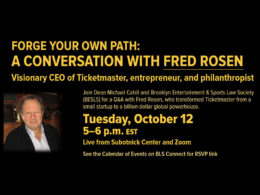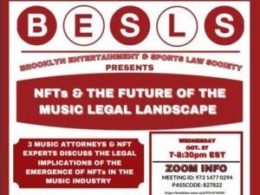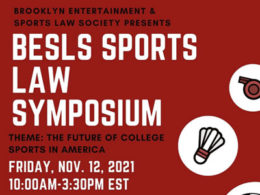On Friday, November 11th the Brooklyn Entertainment and Sports Law Society and the Intellectual Property Law Association hosted the second annual Brooklyn Law School Sports Law Symposium. The symposium theme was “Sports Intellectual Property in a Time of Disruption” and had many students, faculty, practitioners, family and friends in attendance. The event was a great success and BESLS and IPLA are already excited for next year!
The first panel of the day, “Sports Trademarks: Challenges & Opportunities,” provided insightful conversation on the evolving world of trademark law as it pertains to the sports industry. Professor Jodi Balsam (Sports Law Professor at Brooklyn Law School) moderated the panel and was joined by Andrew Patrick (Counsel at MSG Sports), Wendy Li (Associate Counsel at BSE Global), and Mark Conrad (Director of the Sports Business Concentration at Fordham University’s Gabelli School of Business).
The panel began with Andrew and Wendy highlighting how their organizations are extremely protective of their marks. With the growth of merchandising, digital platforms, and social media, the value of sports marks is skyrocketing which warrants diligent protection and enforcement. Much of the day-to-day in their respective roles involves trademark searches and research, sending cease and desist letters, and ensuring that they are receiving as much value from the marks as possible.
Next, Professor Conrad discussed how the emergence of different digital mediums, such as NFTs, poses new trademark law issues that attorneys in the field must confront. Due to a lack of case law and experience within the USPTO, protection of marks in these new forms requires extensive diligence, research, lobbying, and creativity. While there is an abundance of value to be captured in new technology, there is also increased risk, fair use cases, and entry into the public domain.
Professor Balsam then brought up an interesting case in sports trademark law: Penn State v. Vintage Brand, LLC. Although the case is still in its early stages (Penn State’s motion for summary judgment was denied on July 14th), the panelists all agreed that the court’s message was profound. By denying the motion for summary judgment, the court answered the narrow question: Does a symbol identify the source of goods if it merely creates an association between it and the trademark holder? The court determined it does not. By displaying Penn State trademarks on their merchandise, Vintage Brand argued that consumers buy the goods to show support for the school, not because they think the school is the producer of the item. In its summary judgment ruling, the court made clear that trademark law does not provide teams exclusive control over merchandise containing their marks. This result, while still subject to more litigation, can have a major impact on the multibillion-dollar sports trademark licensing business.
The panelists then discussed issues with athletes trademarking their signature poses and phrases. Since these types of marks don’t necessarily represent a product or service, athletes must show use in commerce or an intent to use in commerce. While it is clear that athletes are trying to get protection for these marks, the extent of trademark protection is yet to be seen.
Lastly, the panel concluded with a discussion on why the USPTO is so receptive to claims that sports teams are infringing on other’s marks (i.e. Las Vegas Golden Knights, Cleveland Guardians). Professor Conrad offered a simple answer: “money, money, money.” Trademark laws haven’t changed, but having exclusive control over marks is becoming extremely profitable. Overall, given the increased value associated with sports trademarks, protection and enforcement has never been so important.
BESLS, IPLA, and everyone in attendance would like to thank the panelists and moderator for an insightful conversation on the world of sports trademarks.
Written by: Daniel Erber
Daniel is a 2023 J.D. Candidate at Brooklyn Law School




